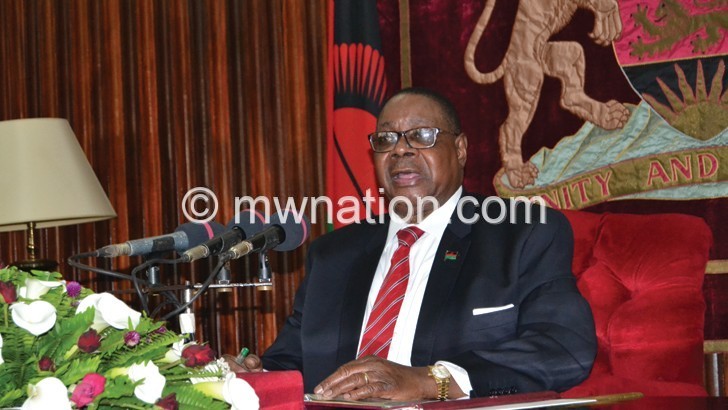Mutharika hints on renewed maize export ban
President Peter Mutharika has hinted on renewing the ban on maize exports as one way of ensuring food availability in the country.
Speaking during the launch of the National Security Policy (NSP) in Lilongwe yesterday, Mutharika said maize is a security commodity; hence, the need to safeguard it.
The move, if effected, may antagonise commercial farmers who blamed the previous export ban lifted last October for negatively affecting prices of the staple grain.

Mutharika said maize scarcity affects the nation’s social security, putting people’s lives and health at risk.
“If my people are to have enough food, I would rather continue with the banning of maize exports to secure them socially than to sell it outside just to please other quarters,” he said.
The President also touched on corruption, urging Malawians to report the vice and avoid politicising it as it compromises the country’s security.
He said: “We need tight security on public resources, no more theft of public funds and never again should we hear of Cashgate happening in this country. We introduced the Integrated Financial Management Information System (Ifmis) to ensure there are no ghost workers in this country.
Corruption has become our culture and Cashgate was the climax of it all. Many believe it’s a normal way of doing things. However, we need to change this, the fight against corruption is a collective fight. Let us avoid, desist and report corruption to end it. It can never be dealt with through prosecution.”
He then called on the Anti-Corruption Bureau (ACB) and the Public Accounts Committee (PAC) to fast track investigations on what he described as ‘so called’ 13 files and K236 billion audit query, saying it is an issue of national interest.
“We are not doing this to please anybody but it is for the interest of the nation. And I repeat, what I have always said, I will never shield anyone from the law,” he added.
Mutharika also described cyber security as a global challenge, calling on stakeholders to work together in addressing it.
“The more we get advanced in technology, the more others use it to destroy society. In Malawi, we have a law on cyber security and registering Sim cards is one step towards ensuring that it works properly and that everyone uses technology responsibly,” he said.
Commenting on the new policy, the President said the NSP will create an integrated and collaborative system that will further strengthen the capacity of government and all stakeholders to deal with current and future threats in the country.
He also promised that his government will ensure economic, food, job, investment and military security to make Malawi a better place for everyone.
In his presentation earlier, chairperson of the NSP task force General Marko Chiziko (retired) said there is need for government and stakeholders to work together to address the new security challenges on economic and social issues.
“These new challenges require more innovative and coordinated responses from the government as well as civil stakeholders, it is hoped that such a participatory approach will go a long way in preserving and enhancing the nation’s values and long-term interests,” said Chiziko.
In his remarks, Chief Secretary to the Government Lloyd Muhara described the launch of the National Security Policy as a milestone saying issues of national security are a prerequisite for national development.
Various stakeholders including the European Union (EU) took part in coming up with the policy.
The policy seeks to guide the country’s decisions and coordinate its actions whenever faced with security challenges.





